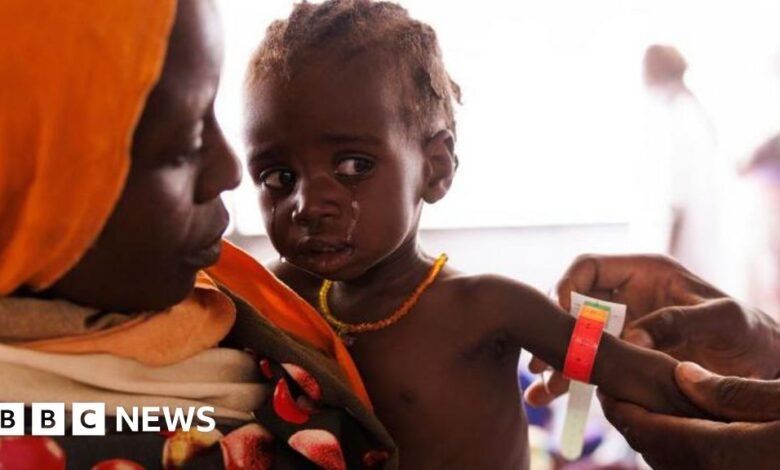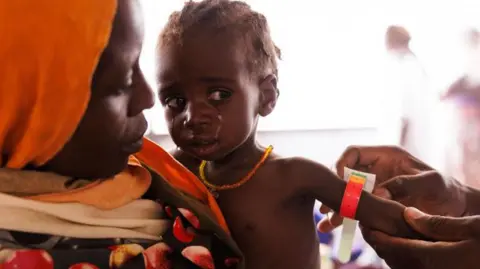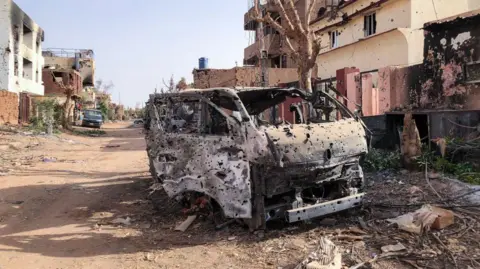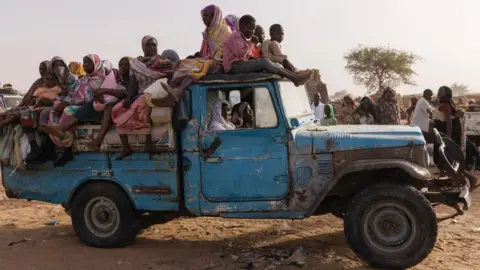Millions face starvation as war rages

By James Copnall, BBC Newsday presenter
 Getty Images
Getty ImagesMohanad el-Balal is one of many Sudanese civilians doing everything they can to ward off a devastating famine – and there is one man whose photograph he will never forget.
Sadiq, a middle-aged father, grips the arms of his wheelchair tightly to keep himself upright, his painfully thin legs poking out in front of him.
Sadig “is in a wheelchair, but he’s not disabled” Mr Balal says: “He’s just so malnourished that he has lost the ability to walk.”
Mr Balal, based in the UK, is one of the co-founders of Khartoum Aid Kitchen, which provides food keeping tens of thousands of people alive in the Sudanese capital.
When volunteers found Sadiq, he “hadn’t had a proper meal for over a month”, Mr Balal said, because any food he could get, he was giving to his children.
Sadly, there are many people like Sadig in Sudan right now.
The country is being destroyed by a war between the Sudanese army and a paramilitary group, the Rapid Support Forces (RSF), which broke out in April last year.
More than nine million people have fled their homes, and everyone in the country has been affected in some way.
Things are about to get worse.
“I expect that by September, we’re looking at about 70% of the population being extremely hungry,” said Timmo Gaasbeek, a food security expert who has worked in Sudan.
“That could lead to two-and-a-half million deaths, or more. It could be as many as four million. There is just not enough food.”
He said the way that food kitchens have been distributing food is a big help but it is not enough.
“The war has paralysed the economy of the country, so people have no money,” said Amgad al-Farid, a veteran human rights activist who runs the Fikra for Studies and Development think-tank.
“Also, the RSF has taken Gezira state, which has the biggest agricultural scheme in Sudan, and produced a lot of our daily needs.
“And due to the huge inflation, food imports have declined,” Dr Farid explained.
In short, there is not enough food, and what food there is has become punishingly expensive.
 AFP
AFPThroughout the war, the BBC’s Newsday programme has been getting regular updates from Ahmed, a resident of Omdurman, one of the three cities that make up the capital.
In one part of Omdurman, controlled by the RSF, prices have increased by 400% in recent times, said Ahmed, who we are only calling by his first name.
“My wife got back from that area, and she told me most of the people eat only once a day, and sometimes not even that.
“It wasn’t like this a few months ago when looted food from factories was sold cheaply.
“Now, in RSF-controlled areas, food has become so expensive and rare.
“Hundreds of people queue up near to where I am to get lentils for breakfast. Some of them add water to the lentils so they can eat it at night-time too,” Ahmed said.
He has had to explain to his young children why they cannot have the biscuits they used to love, and how even though things are tough for his family, it is so much worse for many others.
Ahmed said humanitarian aid rarely gets through, and people are only surviving because of the food kitchens. But some of those are running out of money, and even food to buy.
Mr Balal from Khartoum Aid Kitchen knows of people who have starved to death.
People are struggling, and dying, not only in Khartoum, but also in Darfur, in Kordofan, in Gezira and elsewhere.
Ayman Musa from the NGO the South Kordofan and Blue Nile Coordination Unit spoke of people in the Nuba mountains in the south having to boil leaves to survive.
Aid workers, like Justin Brady, head of the UN’s humanitarian body (Ocha) in Sudan, despair at the lack of international attention on the war in Sudan, and make the point that the international community simply has not provided the funds needed to help the people who need it.
More than $2bn (£1.6bn) was promised at a pledging conference in Paris in April, but Mr Brady said “that is proving a little bit illusory”.
“We’re noting that only under a billion of that is for humanitarian action in Sudan, and some of those funds had already been dispersed, and some of those pledges have yet to materialise.”
 AFP
AFPMany Sudanese believe the world is turning its back on the country’s suffering.
That is not all.
“Both sides use starvation as a weapon of war,” said Alex de Waal from the World Peace Foundation. He has been studying famines and conflict in Sudan since the early 1980s.
The RSF, Mr De Waal said, is “essentially a looting machine.
“They rampage through the countryside and towns, stealing everything there is, and that’s how they sustain themselves.”
While the Sudanese Armed Forces “are trying to starve the areas under control of the RSF” to up the pressure on their rival.
The two sides, Mr De Waal added, “show no signs of any willingness to relinquish what is a cheap and very effective weapon”.
Both sides deny the accusation.
But throughout the country, people are hungry, worrying about where their next meal is going to come from – and in some cases, dying of hunger.
What many agree on is that without an end to the fighting, and a colossal effort to reach desperate people, things will soon get much, much worse.
More BBC stories on Sudan:
 Getty Images/BBC
Getty Images/BBCSource link





